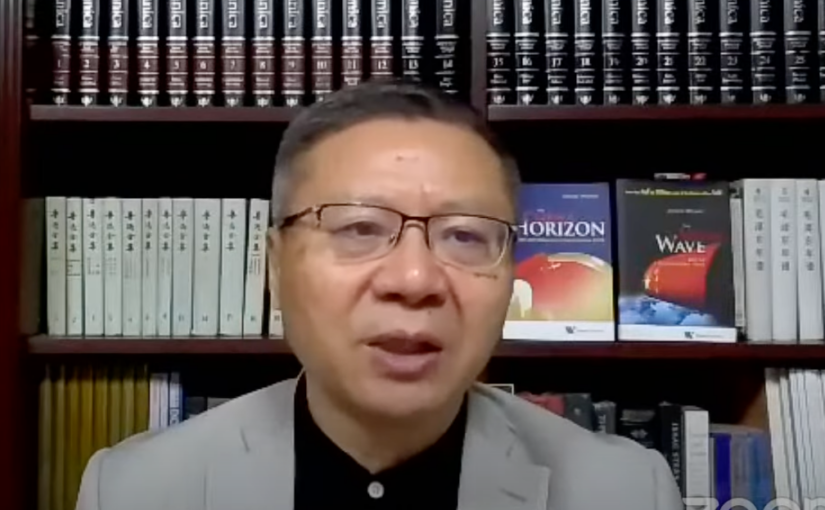The following is the text of a speech given by Professor Zhang Weiwei (Director of the China Institute at Fudan University, and author of several important books about China, including The China Wave: Rise of a Civilizational State) at the webinar Building a multipolar world – Ten years of the Belt and Road Initiative, held on Saturday 4 November.
Professor Zhang outlines the founding principles and broad historic significance of the Belt and Road Initiative (BRI). He notes that the foundations for the BRI were laid during the two stages of China’s rise – the first three decades of socialist construction from 1949 to 1978, followed by the accelerated industrialisation and modernisation of the Reform and Opening Up period – and that both these stages were indispensable in allowing China to break from the US-dominated peripheral-central world order and emerge as an economic leader in its own right.
The BRI is a manifestation of this leadership. It is a “hard power” project, with China providing goods, experience and technologies of the Fourth Industrial Revolution to developing countries, and a “soft power” project, with the socialist principles of “discussing together, building together, and benefiting together” guiding the BRI’s development. Zhang observes that these principles are rooted in China’s consultative democracy and can-do spirit, and have been tested and proven in China’s own modernisation process.
A short report of the webinar can be found on China Daily.
The event stream can be viewed on YouTube.
Hello, comrades and friends,
It’s a great pleasure to speak at this webinar on Building a multipolar world – Ten years of the BRI. I will make three observations:
First, on the rise of socialist China. Indeed, it’s remarkable than with 7 decades of unremitting effort, China has become the world’s largest economy by PPP, and the largest trading nation, with the largest middle income group, and largest consumer market.
This historic transformation can be divided into roughly two stages, the first stage, in the first three decades, under the leadership of Chairman Mao, China laid political, economic and social foundations for its rise.
Then the second stage, from 1978, economic take-off, roughly, “one decade, one Industrial Revolution”. China achieved a miracle of the “Four Industrial Revolutions in One” within four decades or so, and now it is in the premier frontier of the Fourth Industrial Revolution (big data, AI and quantum technologies, etc).
Second, on the Chinese break from the peripheral-central world order and becoming the first super-large socialist country that has meaningfully broken the yoke of dependency on the West.
Internally, China has completely eradicated extreme poverty, achieved medical insurance for all, pension for all, and China now has a higher literacy rate than the US, and higher life expectancy than the US (2 years longer, 2021).
Externally, China has become simultaneously the largest partner for the peripheral countries and center countries in terms of trade, investment, financial resources and technologies. That’s why we rightly predicted in 2018 that US will lose its trade war and tech war against China.
Third, all this has paved the way for the launch of the BRI by President Xi Jinping ten years ago and for its stunning success so far. Its success has to do with what may be called the BRI’s hard power and soft power.
Hard power: China is the only country capable of providing goods, experience and technologies of the Four Industrial Revolutions to the developing countries, and China has helped Africa build 6,000 kilometers of railways and 6,000 kilometers of highways. Many landlocked countries are no longer landlocked, many countries without railways are now with railways. Many people who could not afford smart phones now have smart phones and their countries have 4G or even 5G networks.
China is often capable of providing total solutions to industrialization in developing countries. For instance, China completed a comprehensive petro-chemical production package from scratch for countries like Chad, Sudan and Turkmenistan. Being the world’s largest consumer market, China can accommodate a large number of goods from developing countries. For instance, with the completion of the China-Laotian railway, China has become the largest market for the famous Thai fruit durian, a jump of 65% since the railway was built. Now the durian trade alone created 3 billion dollar business for Thailand and the Chinese consumers benefited from this trade.
Soft power: the motto of the BRI is gòngshāng gòngjiàn gòngxiǎng (共商共建共享) or “discussing together, building together and benefiting together”. These ideas are very socialist and have been tested repeatedly within China’s successful process of modernization.
Discussing together originates from China’s consultative democracy (in both high politics and low politics).
Building together originates from the Chinese can-do spirit. Many Africans described the Western projects in Africa as NATO (No Action, Talk Only) whereas Chinese projects are action-oriented, and once consensus is reached by the parties concerned, actions immediately follow suit.
Benefiting together means, China-aid projects aside, the BRI is not a charity, and most BRI projects are commercially viable ones and win-win for all the parties concerned.
In short, these well tested ideas and practices are guided by a deep-rooted Chinese philosophical belief. If the Western belief can be described as “divide and rule”, then the Chinese one is “unite and prosper”. We practice it at home with stunning success and now we promote it in the BRI, and it’s also working well.
In conclusion, the hard power and the soft power are still gaining momentum as shown in China’s rise and the BRI’s success, and this will surely encourage more and more countries in the Global South to work together in a meaningful way to change the unipolar global order to a multipolar one.


One thought on “Zhang Weiwei: the BRI is built on socialist concepts of discussing together, building together and benefiting together”